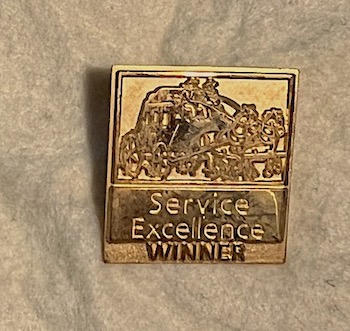Hire for potential, not years of experience… but then what?
There’s a generational shift underway as Boomers leave the workforce and Millennials become the dominant generation.
As of about five years ago, the Millennial generation became the largest in the workforce.
Loosely speaking, the majority of today’s Millennials are in their 30s.
That means a lot of Millennials are being hired into their first managerial roles, or being promoted to executive roles for the first time.
I’m Gen X—between boomers (who came of age before the invention of the TRS-80) and Millennials (who came of age after the collapse of pets.com). This fact becomes relevant later in the post.
Grievance-based semi-truisms
These days, you can’t throw your crumpled-up résumé without hitting someone complaining that the entire recruitment and hiring system is fundamentally broken.
Those people are not wrong. The system, such as it is, is broken. In many ways.
Unfortunately, that’s opened up an enormous marketplace for what I call grievance-based semi-truisms: phrases that on their surface sound insightful to people who feel unfairly treated, but which don’t hold up to scrutiny.
Phrases like “immigrants are coming for your job,” and “unemployed immigrants are a drain on the economy.”
Also, phrases like “hire for potential, not experience.”
What is “potential” anyway?
Let me be clear: There’s nothing at all wrong with hiring for potential. When you hire for potential, you can focus on several truly important aspects of a potential employee:
- Soft skills like empathy, teamwork, and adaptability
- Innate capability and raw talent
- The ability to learn and grow in new areas
- Eagerness and ambition
- Creativity, risk-taking, and problem-solving
If you focus only on years of experience, you may discount or even ignore all those things. Maybe that was okay before the TRS-80 was invented, but the nature of work has changed.
Today, these factors typically listed under “potential” could mean a candidate who’s better able to adapt to and thrive through future changes in work and workplace.

Let’s talk about short-sightedness, not ageism, in this post
(I have a lot to say about ageism and how it’s affecting Gen Xers in particular, but I’m going to stay away from that in this post except to say that “potential” is often shorthand for “young,” yet many older workers have all those things generally considered under “potential.”)
One of the problems with grievance-based semi-truisms is that they allow people to embrace lazy thinking.
As I pointed out above, if you hire based only on years of experience, you might miss out on some really great young talent. I’ve worked with and coached a lot of Millennials who are amazing assets to their teams and their communities.
On the other hand (get ready to have your mind blown), if you hire only for potential and you ignore years of experience, you’re going to get talented but inexperienced people.
🤯
Why is experience important?
I started managing people when I was 23 years old, barely a year out of college. After that first year as a staff engineer at Boeing, I joined software startup Berkeley Softworks (later rebranded Geoworks) to document their operating system API and development tools. I quickly built a small team of tech writers.
I made a lot of mistakes in those early years, and I learned a lot from those mistakes.
This is true for most ambitious and creative people, I’ve found: As you keep stretching for new goals, you make new mistakes, and you learn from those mistakes. That’s one reason I keep learning—I keep stretching to try new things.
If you’re hiring for potential, you should want someone who is ambitious and creative and takes risks. You want someone who is eager to learn and grow.
We all know the old saw, “If you’re not falling down, you’re trying hard enough.”
I subscribe to that attitude, but I prefer a different version of this phrase.
However you look at it, the thing about experience is, it’s a great teacher. Perhaps the best teacher.
People with a lot of experience have made mistakes and, hopefully, learned from them.
I’ve never met a person who never made a mistake. Have you?
So, if you hire someone talented and ambitious but who has little or no experience, you’d better be prepared for them to make all those mistakes under your employment.
How will you respond to those mistakes?
Earlier I mentioned that grievance-based semi-truisms lead to lazy thinking. Here’s where that becomes relevant in this post:
Recruiters and hiring managers love the phrase “hire for potential, not experience” because it gives them permission to fall into a comfortable complacency:
- Less experienced people may be less likely to challenge your expertise or authority
- Less experienced people may cheaper
- Less experienced people may be easier to control
Not in all cases, of course, but these are the biases that creep in to support the “potential, not experience” argument.
The lazy thinking part is this: Once you hire a person with great talent and potential, you can count on them to perform with the same reliability as the person who has years of experience.
But you shouldn’t. You should be prepared for them to make all kinds of mistakes.
First-time managers and new executives need guidance, feedback, support, and good coaching because
- They haven’t yet learned to avoid the worst pitfalls
- They haven’t learned how to “manage up” effectively at their new level
- They feel the twin insecurities of needing to prove their worth, while not wanting to show weakness… thus, they may not raise important issues until those things become real problems
- They haven’t yet built up the resilience to rebound from the bad mistakes they are sure to make

I have personally benefited from the “hire for potential” approach several times in my career. It would be disingenuous for me to turn around now and say “it’s wrong.”
Not only that, I believe in promoting young talent into managerial and executive roles. I don’t believe people should wait until they’re “ready” before moving up.
I’ve also worked for wonderful managers who gave me the guidance, feedback, support, and coaching I needed, and I’ve worked for terrible managers who did the opposite.
You’ve invested in potential… now help them realize that potential
My entire career has been in environments where people tend to hire people into jobs they aren’t ready for: startups, nonprofits, and corporate responsibility.
Often, it’s because the hiring managers don’t fully understand the scope and complexity of the jobs they’re hiring for. Other times, it’s because those positions are where eager, creative talent can grow and thrive and have a big impact.

Here’s where my status as a Gen Xer becomes relevant in this post: Sandwiched between the Boomers and the Millennials, we Gen Xers have one foot in both eras and have a broad perspective that bridges the generations.
I’ve been that young talent, and I’ve hired that young talent. I’ve also hired and managed people much older and more experienced than I. And now I’m moving toward that “much older and more experienced” demographic.
If you’re hiring or have hired someone with great potential, you’ve made an investment in their growth.
What are you doing now to make sure your investment pays off?
Are you simply waiting to see what happens? Maybe not the best plan.
Or are you backing that investment with support, coaching, and guidance that will lead to the highest returns?
If you’re not, then you may be back in a few months hiring for potential again.
This is why I got into coaching
I would love to have a conversation with you about your role, your team, their needs, and your own growth. This is why I got into coaching in the first place—a lot of young, inexperienced talent is being hired into roles they’re not yet ready for, and a lot of their managers aren’t prepared for the needs that young talent will have along the way.
As a Gen Xer with 30 years experience building and managing teams and projects, I’ve got the kind of perspective, experience, and accumulated wisdom that can help you make the most out of the investment you’ve made in hiring your people.
Give me a call and we’ll talk.



0 Comments